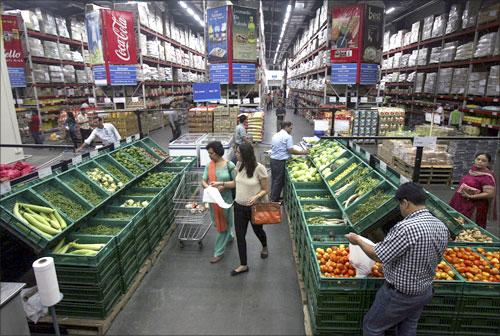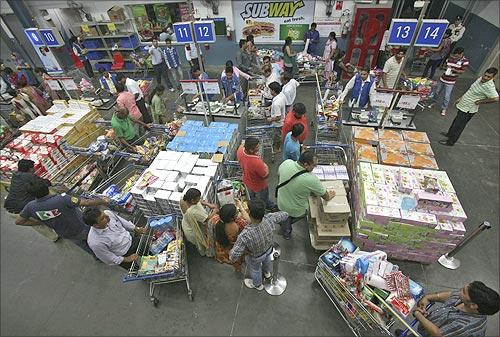Photographs: Ajay Verma/Reuters BS Bureau in Mumbai
It was not so long ago that the United Progressive Alliance staked its survival on allowing foreign direct investment (FDI) in the retail sector.
The point then made was that FDI would help the modernisation of India's leaky farm-to-plate chain for produce and empower local producers at the expense of middlemen.
This logic has been assailed by many, but still seems essentially sound.
…
Is the government serious about FDI in retail?
Image: A warehouse of the Swedish furniture maker Ikea in Wallau near Wiesbaden, Germany.Photographs: Alex Grimm/Reuters
The government then went out of its way to ensure that 100 per cent FDI in single-brand retail faced no more hurdles, making concessions to Swedish household goods giant IKEA in particular.
It is puzzling, therefore, that the same dedication does not seem to be in evidence when it comes to FDI in multi-brand retail - where the supply-chain argument applies most strongly.
Indeed, with the issue of recent "clarifications" by the Department of Industrial Policy and Promotion, or DIPP, the government seems to have decided to ensure that few, if any, actual foreign investors choose to enter the sector.
…
Is the government serious about FDI in retail?
Image: Customers wait to pay for their goods at a Best Price Modern Wholesale store, a joint venture of Walmart Stores Inc and Bharti Enterprises, at Zirakpur, Punjab.Photographs: Ajay Verma/Reuters
The DIPP has set out several restrictions. For one, all structures need to be owned by the company - which means that franchises won't be permitted.
In addition, 50 per cent of the total investment has to go towards back-end infrastructure - but buying existing infrastructure, however poorly used, won't go towards that total.
This will tie up capital uselessly in unprofitable enterprises, rather than freeing it to go elsewhere in investment-starved India.
…
Is the government serious about FDI in retail?
Image: A Walmart Supercenter in Rogers, Arkansas.Photographs: Rick Wilking/Reuters
Further, the clarifications make it appear to most observers that wholesale companies won't be able to sell their products to retailers from the same group, an unnecessary restriction if the ends of the policy are to ensure that corporate investment flows into the entire supply chain.
Some retail business models would also require the operation of the back-end to be outsourced to more local operators - and the new definition of "group companies" appears to rule out that possibility.
…
Is the government serious about FDI in retail?
Image: A Walmart Supercenter in Rogers, Arkansas.Photographs: Rick Wilking/Reuters
The law also stated that 30 per cent of goods had to be sourced from small and medium enterprises; the DIPP has further insisted that these sourced goods should not be agricultural and must be sold in newly constructed stores, not through the acquisition of existing stores or through exports.
On the one hand, it can be argued that these are merely attempts at closing the loopholes in the law and ensuring that retailers invest their money where the government intends them to. However, that isn't a market-oriented way of going about things.
…
Is the government serious about FDI in retail?
Photographs: Reuters
If the point of higher FDI in retail was to trust capital to get to work at declogging India's supply pipe to its cities and towns, the government should get out of the way and not micromanage things.
Instead, it seems to have decided to allow bureaucrats excessive power over where and what companies decide to buy and invest - which defeats the entire purpose of the legislation.
…
Is the government serious about FDI in retail?
Image: A Walmart Neighborhood Market store in Bentonville, Arkansas.Photographs: Reuters
Unsurprisingly, both domestic and foreign retailers are extremely unenthusiastic about the DIPP's actions. Prime Minister Manmohan Singh, at the time the Congress decided to make an issue of FDI in retail, had addressed Indians on television; his party president spoke with him at a rally called on that very issue in Delhi.
Dr Singh should now ask if it is his own administration's statist instincts, and not reluctant state parties, which are causing this forward-looking reform to face unnecessary hurdles.









article